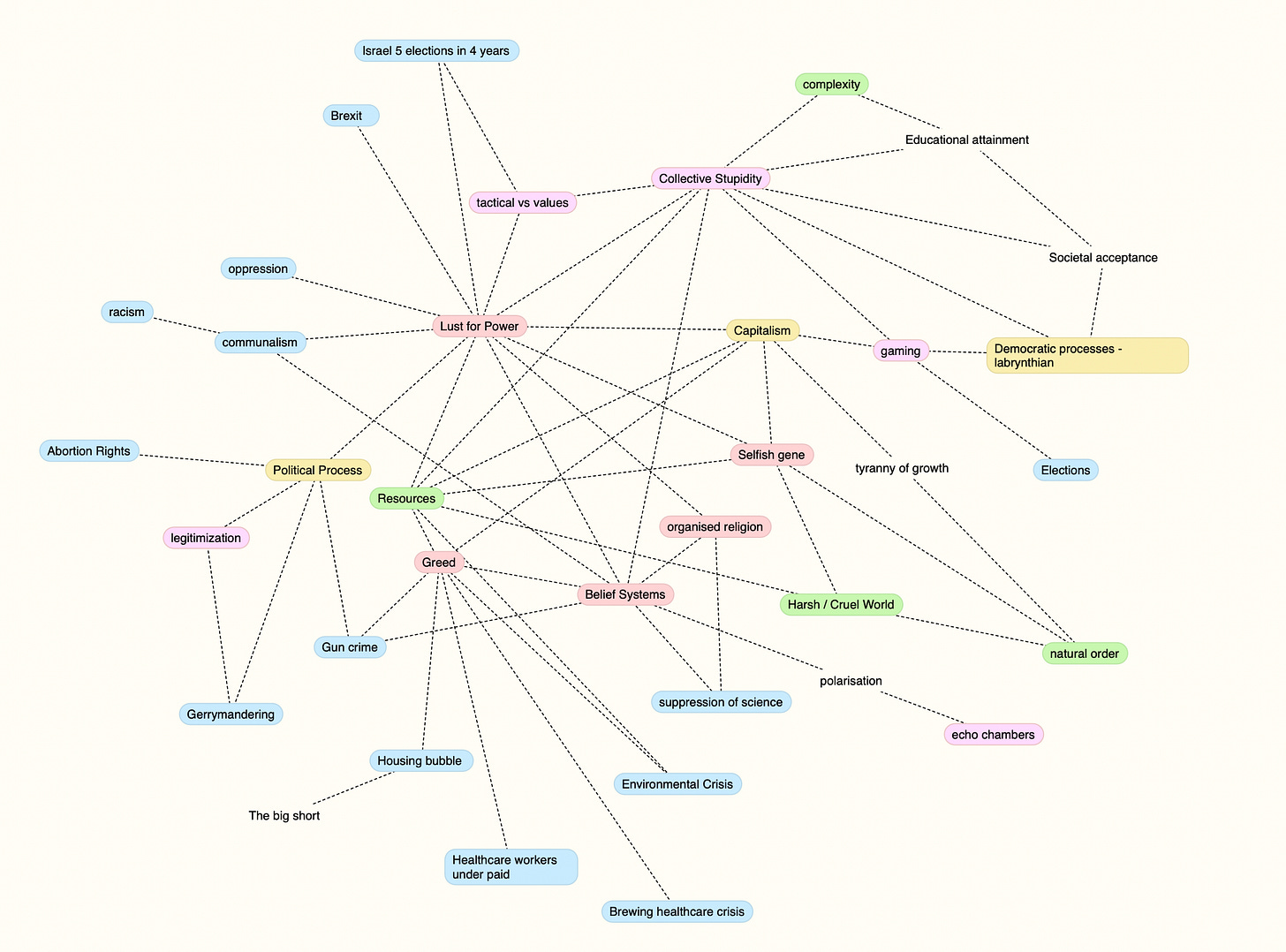IEX #189: Enabling Ecosystems
Collaboration is not an activity but a competence. Most organisations don't have it.

I was speaking with my colleague Frank Diana about ecosystems. Frank has done some excellent and deep thinking about way the world is shaping up in ecosystems. You can see his thinking here. For example you can consider the emergent ecosystem in electric vehicles. Car manufacturers, urban transport, city planners, energy companies, retailers, insurers, battery tech companies, airports, payment providers, fleet owners, rental companies, utilities, market makers, and sustainability experts are all in this ecosystem, even as it starts to take shape. New players are entering this ecosystem regularly. Starbucks recently announced plans to provide EV charging at their outlets.
Some ecosystems, such as urban transport, have been around for a long while. Others like the EV ecosystem described above are evolving as we speak. Ecosystems abound in nature. So what's new about digital ecosystems, you might ask? The answer to this question should begin with the starling murmurations.
Did you know that in a starling flock, each bird can only communicate with 6 others? And yet, despite thousands of birds flying in dense and continuously changing formations, they never collide. And the murmuration is designed to keep predators at bay. This depends on 3 distinct principles. First, the level of real time communication and decision making is incredibly fine tuned. Second, the creation of an overarching 'network intelligence' or a hive-mind. A collective that far surpasses individual intelligence. And finally, the balance between competition and cooperation, and the dominance of cooperation over competition. Especially so, in an environment like the flock which is not a command and control structure, with very little or no hierarchy, so essentially a self governed ecosystem.
Historically, in business ecosystems there is a continuously shifting balance of competition and cooperation. The word 'cooptition' was in vogue a few years ago. We now know that various forms of cooptition are just business as usual. In most industries companies need to cooperate on a vast number of areas, even as they compete for customers, investment, and profits. Two changes have turbocharged this model in the digital era.
First the level of cooperation between organisations across industries has gone up - companies that did not have a simple supplier / vendor relationship are nonetheless connected and partnering, for value. The Avios points system connects American Express, British Airways and other businesses in a way that makes it hard to leave one without leaving the other. The fact that every business is increasingly a technology business has made this even more rampant. Every business has data that might be valuable to other, non-competing businesses. The utility business has data about elderly and vulnerable customers who are unable to heat their homes in winter, which will become a healthcare problem downstream. This data would be a useful early warning system for the healthcare industry. Recently a client with a fleet of cars expressed their challenges in getting battery status data for EVs from the car manufacturers, which would allow them to manage their vehicle utilisation better.
Second, the evolution of digital tools has made it increasingly easier to exchange data, and collaborate across businesses. An entire range of web2.0 services from Slack to Trello allow easy collaboration across organisational lines, the cost of data storage, and transmission has dropped dramatically. And the power of analytics and tools for insight generation means that the value of this operational data, often available in near real time, has shot up. It's like giving every restaurant and cafe at an airport real time updates on flight delays, but also a tool to convert that data into an estimate of the increase in customer volumes expected, with a 10 minute lead time.
But… we're still operating at very low levels of collaboration across the ecosystem - or to put it in another way, we're absolutely not operating as an ecosystem. Almost in direct contravention of the points above, the potential greatly outweighs the reality of ecosystem operation. At the heart of this lies collaboration, and what we've come to realise is that collaboration is often seen as an activity, but in reality it is a competence. And most businesses don't have the collaboration competence required for ecosystem operations. Just to clarify, we're not talking about a contractual data sharing model such as a supplier / buyer relationship, or any others where the legal basis of data sharing is established, usually with much cost and effort. We are talking about much more agile and 'on the fly' data sharing, if you'll forgive the pun on the starling reference. Three things need to be in place for this:
(1) Tools - the incidence of cross-organisation collaboration tools is very spotty. In many businesses these are restricted thanks to security and IT policies, or operate outside the governance of the technology function. The former is limiting and the latter is a risk. Microsoft tools such as Teams and Sharepoint do allow for some level of sharing but it's never really easy. The challenge of standards is also an impediment - some use Google, some Microsoft, and some are on 3rd party tools - Slack or Zoom. TCS has a data marketplace which is also a key ecosystem component.
(2) Processes - most, if not all processes in enterprises are designed to keep data and information in, not share them out. Very few companies have established processes for data sharing with externals - especially the kind of agile, and controlled data exchange that can react in almost real time. Ideally this would be executed though a governed API management layer.
(3) Culture - it would be fair to say that most businesses don't operate from a culture of collaboration. Competition seems much more like the natural order of things and cooperation feels almost counter-intuitive as a path to success. There are very flew roles (outside of tech companies) that are dedicated to creating data and information based alliance relationships, or building and managing ecosystems.
This is an area we’re digging deeper into so expect some more thoughts on this in future. Ciao!
Updates
Earlier in June, I had the pleasure of anchoring a session around edtech and funding for the Good Growth initiative - which brings women entrepreneurs to the fore, organised by my colleague Priyanka. From coding schools (Heather Lyons), to unstructured data (Samantha Campbell), to educational loans for international students (Neha Sethi) - we had inspiring guests and a thoughtful discussion.
At the end of may I was invited to present on Digital Business to the board of an Australian Utility Major, based on my book Doing Digital. Thanks to which I had my first trip to Australia, which I never thought would be a 3 day trip to Perth from London! What did I learn? Apparently most of Australia also thinks Perth is as far away as it feels from here!
Reading
Energy: A look at battery tech and vehicle charging, from the CEO of Blink (Emerging Tech Brew)
Genomes: The $100 Genome sequencing is here, from Ultima Genomics (Ultima Genomics)
Metaverse: Value Creation in the Metaverse (McKinsey)
Science: How parents trauma leaves behavioural traces and PTSD in their children. Scary but reversible. A study in epigenetics (TL/DR) (Scientific American)
Product Innovation: AirUp hacks your brain through scent to make you think you’re tasting a flavour. I know because my daughter has one of these expensive water bottles. as do almost all of her friends. (Fast Company)
Reproductive Health: The implication of employers taking a bigger role in abortion access in the US is of course significant inequality. (Quartz). And there are already significant concerns about erosion privacy and the threat of prosecution, so there are already sites providing updates on how to protect your privacy while searching for abortion options. (EFF)
One More Thing
I seem to have developed a kind of writers block. Heightened work activity, coupled with the state of the world means that every day I read news headlines about the US Supreme Court decisions, or about guns in schools, or healthcare crises, and falling governments, or wars and conflict, and it all makes me think of how insignificant our issues are. I’ve trying very hard to break out this funk, and put pen to paper (or finger to keyboard). Ultimately I just took the time to jot down the maze of thoughts in my head - this maze of words and ideas is still growing, and at some point in the future this may be a long and rambling blog post. But getting this out of my head helped me to get past this, and start writing about innovation again.
Have a great week!




